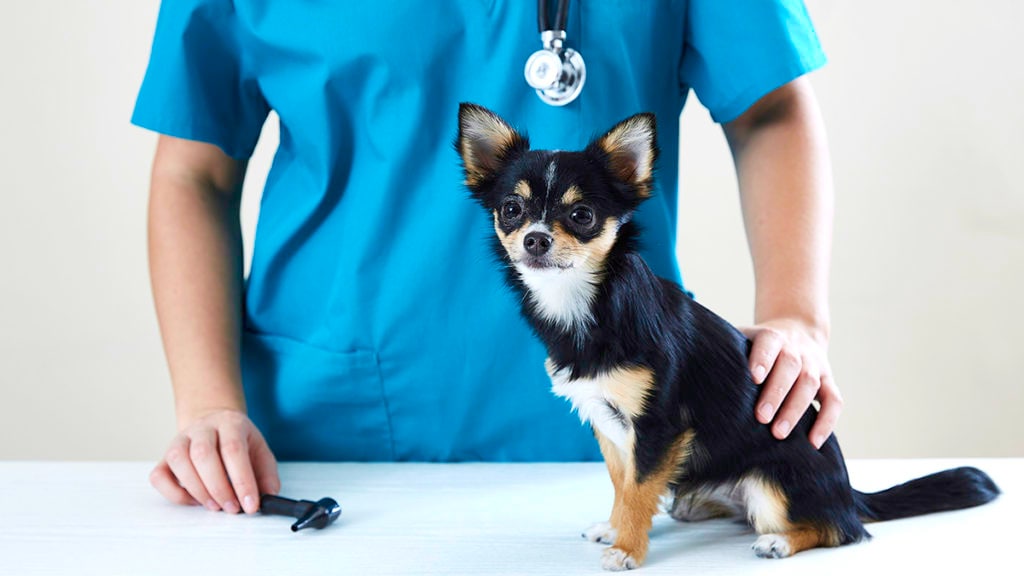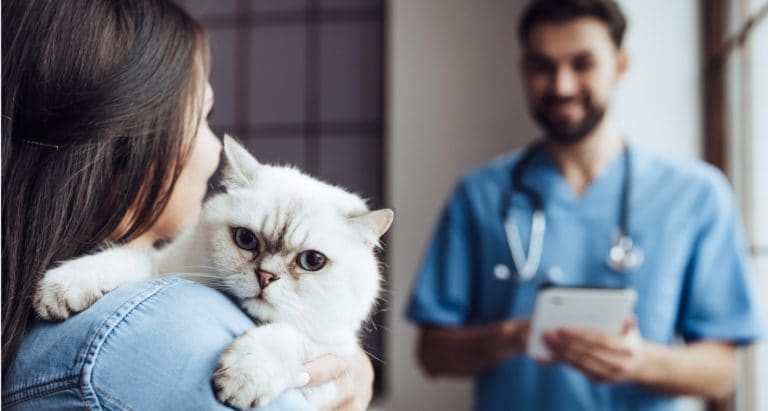Despite having Dr. Internet and all sorts of information available at your fingertips, your veterinarian is still your most trusted go-to on all things regarding pet health and pet care. (The irony that I am writing to you from the Interwebs is not lost on me, by the way). Since the Internet came along, the role of the veterinarian has changed from sole holder and dispenser of all pet health information to a role that is more of an information curator.
If you have ever been to a big art museum, you might agree that the amount of artwork can be overwhelming and confusing. A museum curator can guide you through the museum and teach you more about the art, helping you to appreciate and understand more of what you are observing. A veterinarian functions in much the same way with the billions of Internet pages on dog health and cat health. Don’t be afraid to ask a vet questions about the things you read online, and be prepared to really listen to their point of view when they share it. You have paid for their point of view, after all, so use it!
Here are the top six pet care questions you should be asking your vet.
1. Is my pet’s weight OK?
Over half of the dogs and cats in the United States are overweight or obese, according to the Association for Pet Obesity Prevention. Excess weight is unhealthy for your pet, and can lead to diabetes, arthritis, high blood pressure and heart disease.
One of the most important things you can do to promote wellness in your fur friend is to make sure that they are at a healthy weight. This is so important that I will say it again: Keeping your pet at a normal weight will help your pet stay healthier, and will save you money on food and vet bills.
Your veterinarian is not only an excellent source of information about the proper weight for your pet, but they can also calculate the exact amount of calories to feed per day to maintain lean muscle mass. Vets can design a custom pet weight-loss program and show you how to check your pet’s body condition at home.
2. Do you have any nutritional recommendations?
Proper nutrition is one of the keystones of good pet health, and it is imperative that you know all your options. Your veterinarian is an excellent resource when it comes to learning about all types of diets, and if you ask a veterinarian about nutrition, you are likely to gain a wealth of information. Don’t be afraid to spell out your nutritional preferences, whether you want to feed natural, organic, GMO-free, grain-free, raw, pesticide-free or made in the USA. The more you communicate to your veterinarian, the better they will be able to tailor their recommendations.
When it comes to disease conditions, such as joint mobility issues, stress, sensitive stomachs, itchy skin or urinary problems, there are a whole host of therapeutic diets available to help improve certain pet health concerns without the use of pharmaceuticals. You can heal your pet with food, which is awesome! Even within therapeutic diets, pet parents also have natural options available, so make sure that a discussion about nutrition is part of your annual veterinary visit.
3. Is my pet in pain?
It amazes me how many dogs and cats go in for their annual veterinary visit, receive their parasite control and vaccinations, and leave without a discussion surrounding pain management and quality of life. There is a common misconception out there that slowing down or sleeping more is a natural progression of the aging process, and is normal in older dogs and cats. I humbly beg to differ—these are not the natural consequences of aging; these are subtle signs of chronic pain in pets.
Many pet parents are shocked when I show them the signs of pain to look for, and then feel bad that they missed the fact that their fur friend was suffering in silence. What I always say is that there is no use in feeling bad about it, but there is benefit to getting your veterinarian’s expert opinion on your pet’s comfort level. Hearing about all the options you have to reduce your pet’s pain and promote mobility will help your four-legged friend have a happy life, all the way into his golden years.
4. Do you recommend insurance?
Let’s face it: vet bills for pet care can be expensive! The average dental procedure can easily cost four figures, and arthritis medication for a giant breed dog can cost $100 a month. Veterinarians are saving more pets than ever, but all the education and technology has a cost, and sometimes it can be hard to afford a veterinary emergency, surgery or medication for a chronic condition. That is why pet insurance, in my opinion, is one of the best investments that pet parents can make for their fur child.
Pet insurance is awesome because it takes the money concerns out of the equation when you have to make big medical decisions for your pet, which can give you clarity and peace of mind. There are lots of insurance options out there. Don’t be afraid to ask their opinion on what coverage might be a good fit for your pet.
5. Do you have financing options?
In 16 years of practice, the cost of pet care has been the biggest barrier to pets getting the care they need. It is heartbreaking to pet parents and extraordinarily frustrating to the veterinary professional who knows they could save the animal if they were allowed to treat it.
Many veterinarians are offering financing options now that include monthly payment plans for customers who qualify. So, if you are presented with a large estimate that you don’t immediately have the funds for, tell your veterinarian or veterinary technician that you want to pursue treatment, and you would like to know if they have a monthly payment plan. If they do, then they will usually require a deposit and then have you sign a financial agreement.
Be sure that if you do sign up for a payment plan, that you make the payments on time. Many small businesses, including veterinary offices, rely heavily on these payments. When they’re made on time, it helps vets to be able to continue to offer payment options to pet parents who need them.
6. Why?
Sometimes, the veterinary office experience can be intimidating. The doctor can be intimidating with their stethoscope and white coat, and they are likely busy and juggling several rooms at the same time. Some clients can be so intimidated that they fail to ask clarifying questions when they don’t understand something or don’t feel comfortable.
I want to encourage all pet parents to ask “Why?” If you know the why behind something, then you are empowered, informed and more comfortable.
Here's an example:
Question: Why do veterinary clinics test for heartworm disease every year even if the dog is on heartworm prevention?
Answer: to make sure the medication is working, because there are resistant heartworms in the United States.
Don’t be afraid to ask why even if your vet looks busy—in the long run, they will appreciate your interest in knowing more about your pet’s health.
Share:









